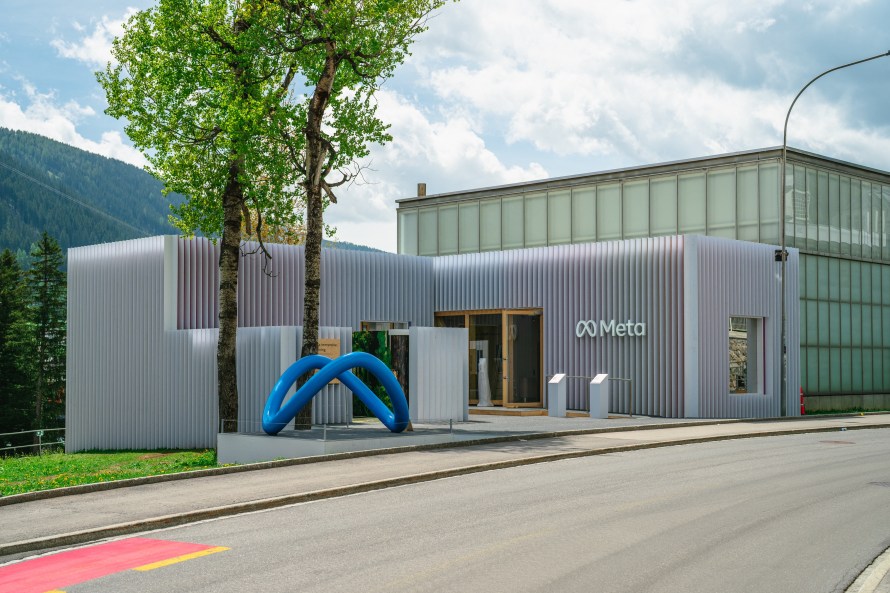The Davos Forum is back after a two year pandemic-enforced hiatus.
Political leaders, business leaders and NGOs are all in Davos in Switzerland to discuss the most pressing issues of our times. This year’s theme – ‘History at a Turning Point’.
The 5 day event looks a little different this year. The guest list is shorter and the timing and weather are all different. Instead of the usual snow and crisp January air, the World Economic Forum (WEF) have included umbrellas in their welcome packs.
At this year’s Davos, there’s a lot of excitement about the metaverse – which we believe is the next computing platform.
The basic story of technology in our lifetimes is that it’s given us the power to express ourselves and experience others with ever greater richness.
When Facebook started, that mostly meant text that we typed on computers. Then we got phones with cameras and the internet became much more visual. Recently, connections got faster, and video has become the main way we experience content. We’ve gone from desktop to web to phones. From text to photos to videos.
But this isn’t the end of the line. The next platform and medium will be even more immersive – an embodied internet where you’re IN the experience, not just looking at it.
A future built by everyone, for everyone, where your imagination is more important than the circumstances of your birth. Where you can represent yourself however you want. A future that everyone will have a stake in.
A future where individuals and businesses will be able to build, own, invest, sell, and be rewarded for a vast and diverse range of creative output.
We call this the metaverse. And you’ll be able to do almost anything you can imagine — get together with friends and family, work, learn, play, shop, create — as well as completely new categories that don’t really fit how we think about computers or phones today.
This isn’t about taking time away from being together in-person. It’s about making the time we do spend online richer and more meaningful.
At Davos this year, we’re discussing the metaverse and why we think it’s going to be so important:
- We’re talking about the fact that building the metaverse is going to be a collaborative project and that no one company can or should own the metaverse.
- We’re also starting conversations about the metaverse now so that the right protections are built into the foundations. We’ve announced at Davos this week that we will be a part of a new initiative by the World Economic Forum, ‘Defining and Building the Metaverse,’ that will bring together key stakeholders to build an economically viable, interoperable, safe and inclusive metaverse.
- We’re also acknowledging that there is still a lot to do before the metaverse becomes a reality. Lots of hardware still needs to be built, infrastructure needs to be transformed and crucially – global access to hardware and reliable internet needs to be improved.
- While companies like ours can help build the metaverse, we know that it will be creators and entrepreneurs who will truly define its potential. Through Meta Immersive Learning, Meta is investing $150 million to help develop and empower the next generation of creators, launch high quality immersive experiences that transform the way we learn, and increase access to learning through technology.
- The economic opportunity of the metaverse is huge. This is something I have been speaking to our clients and partners about at Davos. Our hope is that within a decade, the metaverse will reach a billion people, host hundreds of billions of dollars of digital commerce, and support jobs for millions of creators and developers. According to a new paper by Analysis Group and funded by Meta, the metaverse has the potential to add an estimated $3 trillion to the global economy in a decade if adoption and growth are similar to mobile technology. Europe’s estimate is a 1.7% contribution to regional GDP, or $440 billion, in 2031.
- Chris Cox, Meta’s Chief Product Officer, took to the stage at Davos to talk about making the metaverse in more detail. Nick Clegg, Meta’s President of Global Affairs has also published a recent essay outlining what the metaverse is, how it will be built, and why it matters.
Davos has long been the place where key conversations about the future happen.
We’re proud to be speaking about the metaverse because its impact will be felt by all of us and the work that is done now will go on to define a generation.

